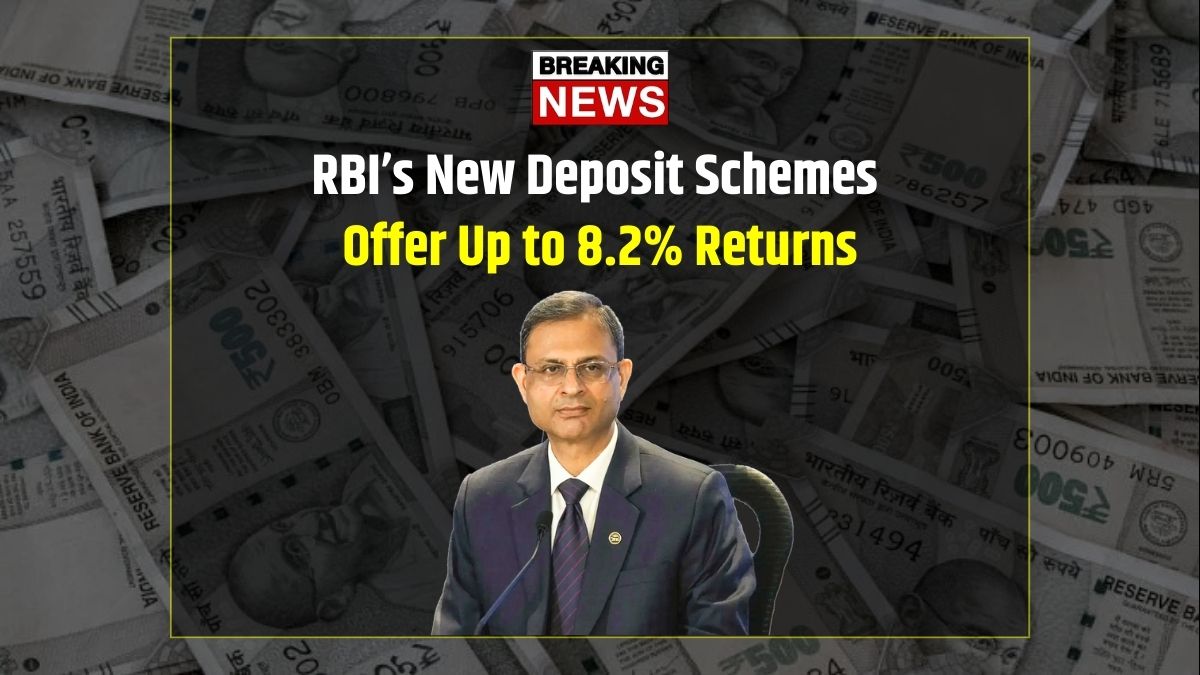RBI New Deposit Schemes – The Reserve Bank of India (RBI) has introduced three brand-new deposit schemes in 2025, and if you’re someone who prefers safe investments with steady returns, this is something you’ll want to pay attention to. The schemes come with higher interest rates, joint investment options, and even tax-saving perks, especially if you invest strategically — like in your spouse’s name.
So, what are these schemes all about, and how can you make the most of them (maybe with a smart ₹2,22,222 investment)? Let’s break it all down.
What Are These New RBI Deposit Schemes?
RBI’s new deposit offerings are targeted toward different types of savers — from regular investors to senior citizens and couples. Here are the three schemes launched:
- Smart Saver Fixed Deposit Scheme
- Spouse Benefit Joint Deposit Scheme
- Senior Plus Monthly Income Plan
They’re designed to give better returns than traditional FDs, while also helping families and retirees plan their finances more effectively.
Key Features to Know
Here’s why these schemes are creating buzz:
- Higher interest rates than standard bank FDs
- Joint account options (especially for spouses)
- Flexible tenures ranging from 1 to 10 years
- Tax-saving benefits under Section 80C (on select schemes)
- Monthly or annual payout choices
- Backed by the RBI – so your money’s in safe hands
Quick Look: Scheme Comparison
| Feature | Smart Saver FD | Spouse Benefit Joint Scheme | Senior Plus Monthly Plan |
|---|---|---|---|
| Interest Rate | 7.5% | 7.8% | 8.2% |
| Minimum Investment | ₹50,000 | ₹1,00,000 | ₹75,000 |
| Max Investment | ₹25L | ₹10L | ₹15L |
| Tenure | 2–5 yrs | 3–7 yrs | 5–10 yrs |
| Payout | Quarterly | Annual or on Maturity | Monthly |
| Tax Benefits | 80C eligible | Partial | None |
| Spouse Investment | Not needed | Mandatory | Optional |
Why This ₹2,22,222 Strategy in Spouse’s Name Works
A lot of financial advisors are talking about this now — investing ₹2,22,222 in your spouse’s name under the Spouse Benefit Joint Scheme. Here’s why it makes sense:
- You get a 7.8% annual return, which is better than most FDs
- Since it’s in your spouse’s name, it can reduce your family’s total tax liability
- Gifting money to a spouse is tax-free, so you won’t face any gift tax issues
- Plus, in case of emergencies, joint ownership ensures quick access to funds without legal hassles
What Will ₹2,22,222 Earn You?
Let’s see what this amount could grow into at 7.8% interest:
| Tenure | Total Return | Interest Earned |
|---|---|---|
| 3 Years | ₹2,77,315 | ₹55,093 |
| 5 Years | ₹3,26,151 | ₹1,03,929 |
| 7 Years | ₹3,83,400 | ₹1,61,178 |
These are annual compounding figures — and yes, they look pretty sweet for a low-risk investment.
How Do the Taxes Work?
Here’s what you should keep in mind:
- The Smart Saver FD qualifies for Section 80C deductions, up to ₹1.5 lakh/year
- Interest earned is taxable, unless the income falls below the taxable limit
- If your spouse falls in a lower tax slab, you can reduce the tax impact
- You can submit Form 15G or 15H to avoid TDS, if eligible
How to Invest in These Schemes
Getting started is simple:
- Visit your nearest RBI-authorized bank or log in to online banking
- Pick a scheme that fits your goals — income, long-term saving, etc.
- Fill out the deposit form and select if it’s in your name or your spouse’s
- Submit your PAN, Aadhaar, and proof of address
- Deposit the money and get your FD certificate or digital confirmation
Ideal for Whom?
These schemes are a solid option for:
- Middle-class families looking for safe returns
- Couples wanting to save jointly or create a separate income stream
- Retired individuals who need monthly income
- Anyone who wants zero market risk and stable returns
Pros & Cons at a Glance
Pros
- Higher returns than regular FDs
- RBI backing means low risk
- Joint holding options and tax planning benefits
- Multiple payout options
Cons
- Interest is taxable (unless planned smartly)
- Early withdrawal comes with penalties
- No exposure to inflation-beating growth like equity offers
Smart Tips to Maximize ₹2,22,222 Investment
- Invest in your spouse’s name if they’re in a lower or no tax bracket
- Choose longer tenure (5–7 years) to take advantage of compounding
- Opt for maturity payout if you don’t need monthly income — for better corpus growth
- Split the investment across 2-3 schemes to diversify
- Use net banking or mobile apps to track and reinvest easily
Final Thoughts
RBI’s new deposit schemes are a great option if you’re looking for steady, secure returns without worrying about market ups and downs. With higher interest rates, tax-saving perks, and the flexibility of joint accounts — especially with smart amounts like ₹2,22,222 in your spouse’s name — you can really make your money work for you.
Whether you’re planning for retirement, building a rainy-day fund, or just looking for a better FD, these schemes are definitely worth a closer look.





